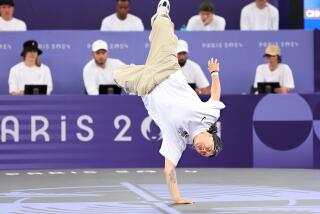From the mouths of babes
- Share via
China’s never been known for its stellar policies on little girls. But this week, its female trouble in Beijing has been especially vexing. There are, of course, the rumblings about members of the Chinese women’s gymnastics team who appear younger than the International Olympic Committee’s age requirement of 16. But that controversy has been put on the back burner by the fracas surrounding Lin Miaoke, the 9-year-old who lip-synced “Ode to the Motherland” during the opening ceremony.
The real voice behind the pig-tailed and photogenic Miaoke turned out to be that of 7-year-old Yang Peiyi. A gifted singer with a round face and crooked baby teeth, Peiyi was scheduled to perform at the ceremony until Communist Party authorities deemed her not cute enough for the job. Then, when her replacement’s vocal skills were found to be lacking, ceremony organizers decided to have it both ways: Peiyi’s voice was played while Miaoke, a veteran of Chinese television commercials, stood before the crowd of 91,000 at the National Stadium and adorably moved her lips -- maybe she was singing, but the microphone wasn’t turned on.
Ever since the Chinese media broke the story, cries of totalitarian-style foul play, along with copious references to the lip-syncing, Grammy-stripped 1980s duo Milli Vanilli, have been in heavy pundit and blogosphere rotation. Ceremony organizers, already under criticism for digitally enhancing a fireworks display, are being accused of sacrificing Peiyi’s self-esteem for the sake of artificial beauty standards and rigid nationalism.
“The reason was for the national interest,” Chen Qigang, music director of the opening ceremony, said in an interview. “The child on camera should be flawless in image, internal feeling and expression.”
Flawless in image, internal feeling and expression? What an outrage! No wonder Americans are scandalized by this hybrid performance. Over here, this would never happen. Over here, we’d choose the beautiful person as a matter of course and then ignore -- or not care about -- the fact that she couldn’t sing as well.
For all those who’ve suggested that the Miaoke-Peiyi stunt proves the stranglehold of authoritarianism, plenty of others have seen it as a symbol of China’s embrace of American-style capitalist values. After all, we made shallowness not just a national pastime but a major export. Thanks largely to our example, the receipts of the global cosmetic surgery industry are thought to exceed the gross domestic product of Somalia four-fold. If China feels uneasy about enlisting a girl with crooked teeth as the face of its children, it’s easy to lay blame on the way American pop culture has redefined phony notions of attractiveness as baseline criteria.
Not so fast, I say. China may have played the shallow card, but it played it differently from how we would have. Americans are obsessed with artifice and perfection as it applies to our physical selves, but we’re equally obsessed with “authenticity.” Sure, we love our teeth-whitening technology and our freakishly flawless celebrities, but we also love to talk about “keeping it real.” Even when things are scripted, we like to pretend they’re not. Even when an actor or an athlete or a CEO has been honing his craft and building his resume for years, we pretend that he was just discovered, that he emerged fully formed out of a cabbage patch. When it comes to a pop heroine for the masses, as long as she’s suitably hot looking, it’s almost better if she’s not stratospherically talented but more “real.” All the easier that way to pretend that we have a chance at that kind of stardom ourselves.
The realm of popular music, of course, has long favored sex appeal over genuine talent. Granted, “American Idol” has introduced a hint of democracy into the corporate labyrinth of the music business (it’s only after the show that the winners are reshaped into wax figures), but, with a few exceptions, being really good-looking and just a little bit talented will get you further than being average-looking and extraordinarily talented. How else can you explain Pierce Brosnan butchering his songs in “Mama Mia!” or Janet Jackson’s entire career?
Don’t misunderstand me. Like most people who don’t work for the Chinese government, I think it was lame and creepy, not to mention antithetical to the spirit of the Games, to make Miaoke lip-sync to Peiyi’s voice. But for all its wrongheadedness, it revealed an appreciation of genuine talent. At least the best voice got heard.
Yes, China was deceptive. Yes, it belied its shallowness and insecurity by hiding Peiyi from view. But it also honored her in a way that the American reward system is largely incapable of. It recognized Peiyi’s talent for its own sake. It showed respect for her voice as an instrument wholly separate from her beauty.
Was looks-discrimination in play? You bet. But so was a discriminating ear.
--
More to Read
Go beyond the scoreboard
Get the latest on L.A.'s teams in the daily Sports Report newsletter.
You may occasionally receive promotional content from the Los Angeles Times.







